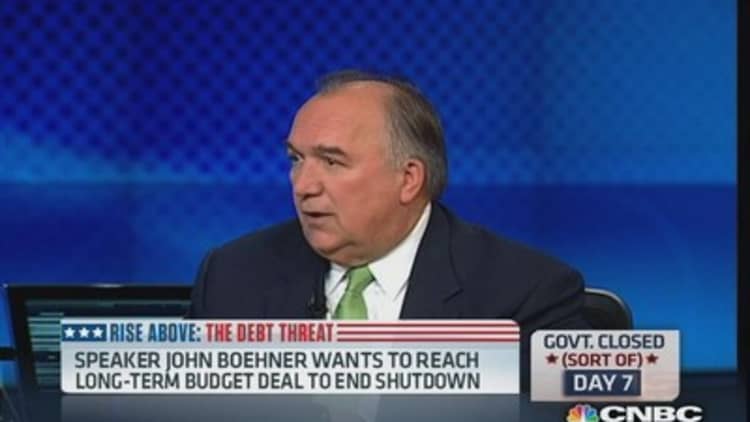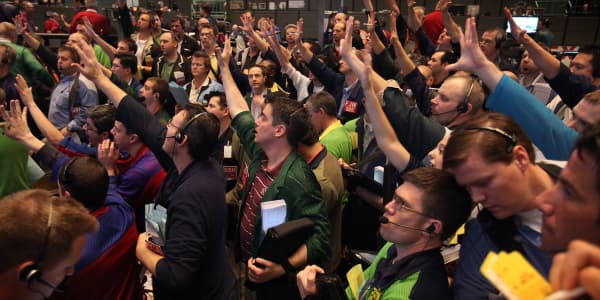Yields on one-month Treasury bills continue to head higher this week, a sign that investors are getting increasingly nervous about the prospect of the U.S. government defaulting on its debt obligations.
The U.S. could start to miss payments on its debt if Congress and the White House fail to reach a deal to lift the $16.7 trillion limit on government borrowing by October 17.
(Read more: US growth in dangers as shutdown heads into second week)
Analysts say worries about the risk of a delay in being repaid and fears that a divided Congress will struggle to reach a deal on raising the debt ceiling means investors are shunning very short-dated U.S. Treasurys.
The yield on one month Treasury bills has risen to its highest level since late last year, according to Reuters data. It was trading around 0.16 percent on Tuesday, up about 14 basis points from where it was a week ago and above the 0.03 percent yield on three-month bills.

"The reason financial markets have been relatively calm is that nobody believes the U.S. will default on its debt," Kelvin Tay, regional CIO for southern Asia-Pacific at UBS Wealth Management, told CNBC Asia's "Squawk Box." "But it is interesting that the one-month U.S. Treasury bill has started to react to that and that the yield has shot up quite sharply over the past couple of weeks."
Although a debt default, which would have ripple effects across the global economy, is widely seen as unlikely, a budget impasse in Washington that has shut down the government for the past week has raised concerns about a similar stalemate on the debt ceiling negotiations.
(Read more: Misunderstanding debt ceilings, deficits and defaults)
"We have been following the T-Bill due on October 24 very closely since the shutdown [began]," Evan Lucas, market strategist at trading firm IG, said in a note. "It has once again climbed a further six basis points, which coupled with the move in the VIX, suggests trading over the next week is going to be almost one direction until the impasse is resolved," he said, referring to the VIX index, a barometer of risk appetite.
Uneasy
A debt default could trigger a crisis of confidence in the world's biggest economy, raise the prospect of a credit ratings downgrade and deal a huge blow to the economic recovery that is starting to take hold, analysts say.
"I don't think there will be a default but we are starting to see concerns about [the U.S.] rating and a downgrade of that. This would be an unprecedented event," said Ben Lichtenstein, president at Tradersaudio.com, told CNBC.
(Read more: So what if there's a default? 5 things to remember)
There were growing signs on Tuesday that the world was starting to get increasingly uneasy about the U.S. debt ceiling debate.
Japan's Finance Minister Taro Aso was quoted as saying he wanted the U.S. to resolve the standoff over the debt ceiling quickly.
Japan is the second largest foreign owner of U.S. Treasurys after China.
The Chinese government meanwhile has warned the U.S. that a shutdown and prospect of a default were threatening the .
Qantas airlines CEO Alan Joyce told CNBC on Tuesday that corporates around the world would be watching developments in the U.S. closely over the next couple of weeks.
"The debt ceiling debate issue is probably more important than the government shutdown and if America defaults on its debt, we would be in uncharted territory and every company would be looking at that," he said. "We are a bit concerned about that at the moment."
—By CNBC.Com's Dhara Ranasinghe; Follow her on Twitter @DharaCNBC





